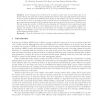Free Online Productivity Tools
i2Speak
i2Symbol
i2OCR
iTex2Img
iWeb2Print
iWeb2Shot
i2Type
iPdf2Split
iPdf2Merge
i2Bopomofo
i2Arabic
i2Style
i2Image
i2PDF
iLatex2Rtf
Sci2ools
PKC
2009
Springer
2009
Springer
Modeling Key Compromise Impersonation Attacks on Group Key Exchange Protocols
A key exchange protocol allows a set of parties to agree upon a secret session key over a public network. Two-party key exchange (2PKE) protocols have been rigorously analyzed under various models considering different adversarial actions. However, the analysis of group key exchange (GKE) protocols has not been as extensive as that of 2PKE protocols. Particularly, the security attribute of key compromise impersonation (KCI) resilience has so far been ignored for the case of GKE protocols. We first model the security of GKE protocols addressing KCI attacks by both outsider and insider adversaries. We then show that a few existing protocols are not secure even against outsider KCI attacks. The attacks on these protocols demonstrate the necessity of considering KCI resilience for GKE protocols. Finally, we give a new proof of security for an existing GKE protocol under the revised model assuming random oracles. Keywords. Group Key Exchange, Key Compromise Impersonation, Insider Attacks.
Cryptography | Key Compromise Impersonation | Outsider Kci Attacks | PKC 2009 | Protocols Addressing Kci |
| Added | 25 Nov 2009 |
| Updated | 25 Nov 2009 |
| Type | Conference |
| Year | 2009 |
| Where | PKC |
| Authors | Colin Boyd, Juan Manuel González Nieto, M. Choudary Gorantla |
Comments (0)

